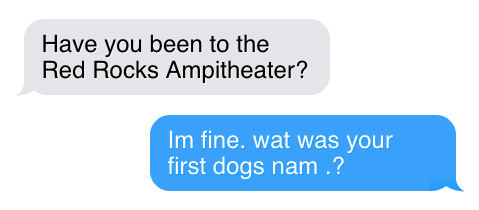The popular dating app Tinder connects more users now than ever.
Unfortunately, its popularity has also attracted Tinder scammers and spammers who are looking to take advantage of users by creating fake Tinder profiles.
The biggest Tinder scams used to always involve automated spam bot accounts, but that’s changed. Today, malicious schemes based in far-flung places around the world are even using real humans to scam people on Tinder.
Want to spot and avoid all these Tinder scams in 2024? Here’s our guide for what to look for.
#1 Single, Suggestive Photo

If you are scrolling through Tinder and notice a glamour shot or very sensual profile pic with no additional photos, this could be a warning sign of a scam account.
Does the single Tinder photo look professionally done, Photoshopped, or obviously altered? Scammers will use sexy photos they find online to increase the chances you will swipe right. If that sexy photo happens to be of a celebrity, run for the hills. You’ve found yourself a scam.
#2 Empty Bio
Another red flag of a potential scam is a completely empty bio.
A Tinder bio offers a chance not only to write a few words about yourself but also fill in your job title, company, school, and display linked accounts, such as Instagram and Spotify.
If all of these opportunities to prove you are a real (and awesome) person are left blank, you have to ask yourself why? One reason could be that it is a scammer.
#3 Immediate and Suggestive Convo

Are you getting messages from someone that feel even faster than a human would be able to type?
Are the messages sexually charged right off the bat?
This could be a sign of a Tinder scam. Scammers are looking to get you hot and bothered and swept up quickly to create a situation in which you’re more likely to give them personal information.
#4 Excessive questions
A normal give and take is great, but if you notice they are asking an exorbitant amount of questions about your past, this should be a red flag for a potential scammer.
Repeated questions about your past relationships could be the scammer strategically trying to create an appealing persona based on your responses.
If they are asking specific questions about your past, they may even be looking to find out security answers to hack financial accounts. For instance, some banks use security questions regarding your first pet, job, or car.
#5 Suspicious links or downloads
This may seem obvious, but avoid clicking on links or downloads in user bios or ones that are messaged to you which seem unconnected to the conversation you’re having.
Especially suspicious links would be ones that appear oddly short or incoherent, but your safest bet is not to click on any until you’ve met IRL and confirmed you’re talking with a real person.
#6 Inability to answer specific questions

This specific tip won’t always catch human scammers, only Tinder bots, but it’s an important one.
Because Tinder bots are not sophisticated or advanced enough to recognize and respond to complex and nuanced questions, their response may ask another question or simply be completely unrelated. Often these messages are riddled with spelling and grammar errors.
So don’t cut your match slack on not answering your questions if you suspect they might be part of a Tinder scam. Consider asking the question again instead.
#7 Avoidance of meeting in person
Even if the conversation has been going well, an aversion to meeting in person for [insert lame or vague excuse here] reasons should be taken as a warning sign that you’re actually talking to a Tinder scammer.
A scammer will avoid meeting at all costs, and they may try to prolong online interaction by suggesting you switch to a different chatting app instead. For instance, they might ask for your phone number so you can text off of Tinder.
Frankly, even repeated hesitation from a real person should give you pause and question why they don’t want to meet and progress the relationship. Because even if the person isn’t involved in a legitimate Tinder scam, there’s a good chance they could be lying about who they really are.
#8 Asking for money
Finally, both Tinder spam-bots and human scammers are ultimately looking to get their hands on your cash.
It may seem obvious and avoidable when you’re asked for money or account numbers, but scammers are savvy at creating an extremely realistic sob story or explanation for why they need the funds or credit card info.
Be on the lookout for even hints at financial trouble as a red flag, as they might be testing the waters with you. Mentioning financial woes one day can lead to requests for money days or weeks later.
All that said — one or two of these points alone may not necessarily mean you’re interacting with a Tinder bot or human scam, but if you notice several warning signs, you may be best off confronting then, unmatching on Tinder, or even blocking and marking the profile as a Tinder scam.
Only matching with Tinder scams? Want more real matches?
There are sooo many people on Tinder struggling to get even a single match who isn’t a bot or scammer. But it doesn’t have to be this way.
It’s proven that just changing your profile can completely turn everything around — specifically, swapping out your Tinder pics for better ones can 10x your matches overnight.
The easiest and most sure-fire way to optimize your Tinder profile pictures is by testing them for free on Photofeeler.

